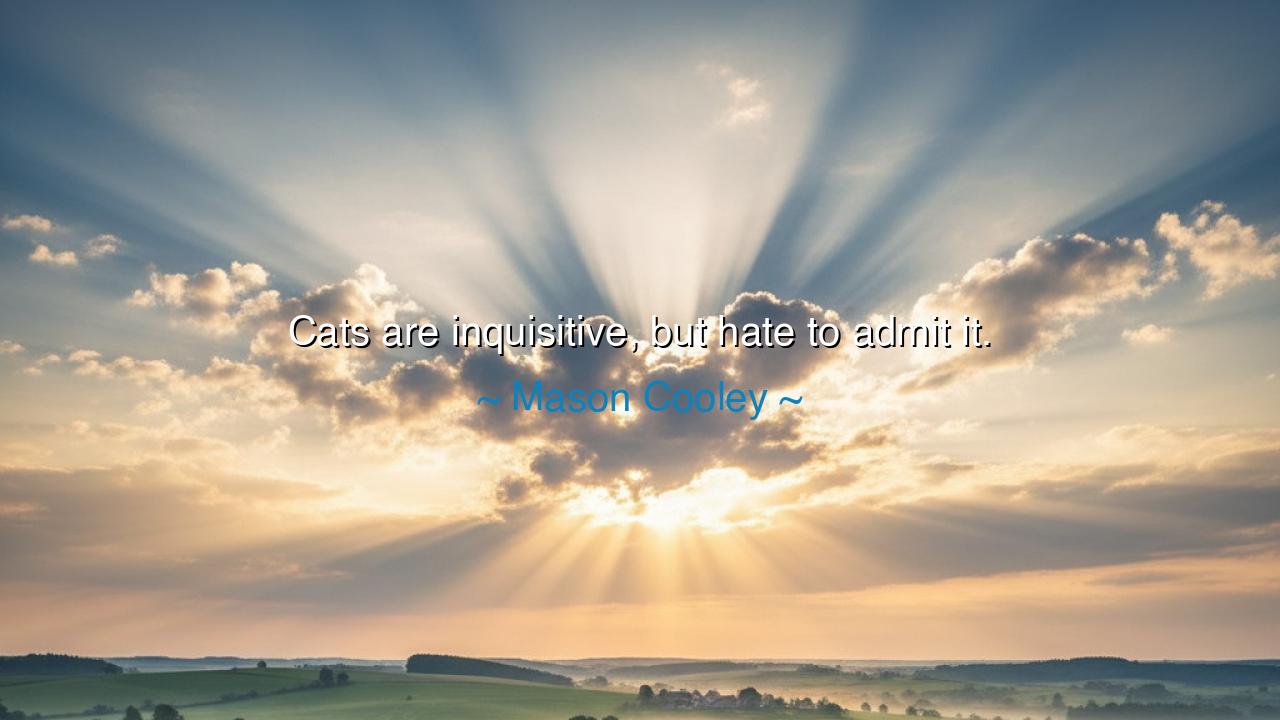
Cats are inquisitive, but hate to admit it.






Hear the playful yet piercing words of Mason Cooley: “Cats are inquisitive, but hate to admit it.” At first, this saying stirs a smile, for it captures the paradoxical dignity of the cat—forever curious, forever prowling into corners, and yet carrying itself with a regal air, as though its actions are never driven by base curiosity, but by sovereign will. But beneath this jest lies a lesson for mankind, for we too are creatures of inquiry who often cloak our searching hearts with the mask of indifference.
The ancients saw in the cat a symbol of mystery. In Egypt, the cat was sacred, revered as the companion of Bastet, goddess of protection and home. The cat’s eyes, glimmering in the dark, were thought to pierce the unseen; its movements, silent and deliberate, suggested wisdom beyond human grasp. And yet, even as it investigated every hidden place, the cat would return with a look that seemed to say, “I meant nothing by it.” In this duality lies Cooley’s truth: curiosity wedded with pride, inquiry hidden beneath aloofness.
So it is also with mankind. We are inquisitive by nature, ever hungering to know, to seek, to uncover. It was curiosity that drove the Greeks to chart the stars, curiosity that led the Persians to carve their empires, curiosity that drew Columbus across the ocean. Yet men often hide this longing. Out of fear of seeming weak, or pride in appearing wise already, they disguise their searching as certainty. Just as the cat leaps at the fluttering curtain and then pretends it was nothing at all, so man asks his questions in secret, unwilling to admit how little he truly knows.
Consider the tale of Galileo Galilei, who with his telescope peered into the heavens and discovered moons circling Jupiter. His curiosity revealed truths that shattered the proud beliefs of his age. Yet those who held power, hating to admit their own ignorance, condemned him for daring to look more closely than they. In this story, both cat and man are reflected: one boldly inquisitive, the other hiding its curiosity behind denial. Galileo, unlike the cat, did not disguise his questioning, and though he suffered for it, the truth he uncovered endures to this day.
Cooley’s words are thus a reminder of both the strength and the weakness of curiosity. The cat teaches us that inquiry is natural, that to seek is part of being alive. But the cat also reveals our human tendency to mask this desire for knowledge with pride, to act as though we already know all, when in truth we are fumbling explorers in the vast wilderness of the unknown. To hate to admit curiosity is to deny our deepest nature.
What lesson, then, should we take from this? We must learn to embrace curiosity openly, not in secret. To ask, to seek, to wonder—these are not signs of ignorance, but of courage. The child who asks “why?” endlessly is wiser than the adult who hides behind false certainty. The cat may keep its mask of pride, but man must not, lest he remain forever trapped in the shadows of his own pretense.
So, O listener, let this wisdom be your guide: be inquisitive, and admit it. Ask questions without shame. Seek knowledge with humility. Approach life not as a monarch who already reigns, but as a pilgrim who has just begun the journey. For in admitting your curiosity, you open the gates to wisdom. In hiding it, you remain forever behind the veil.
Thus, let Mason Cooley’s words live on: “Cats are inquisitive, but hate to admit it.” Learn from the cat’s curiosity, but do not inherit its pride. Be bold enough to wonder, humble enough to confess it, and steadfast enough to pursue truth wherever it hides. In this way, your life shall not be a masquerade of certainty, but a living testament to the power of open inquiry.






AAdministratorAdministrator
Welcome, honored guests. Please leave a comment, we will respond soon